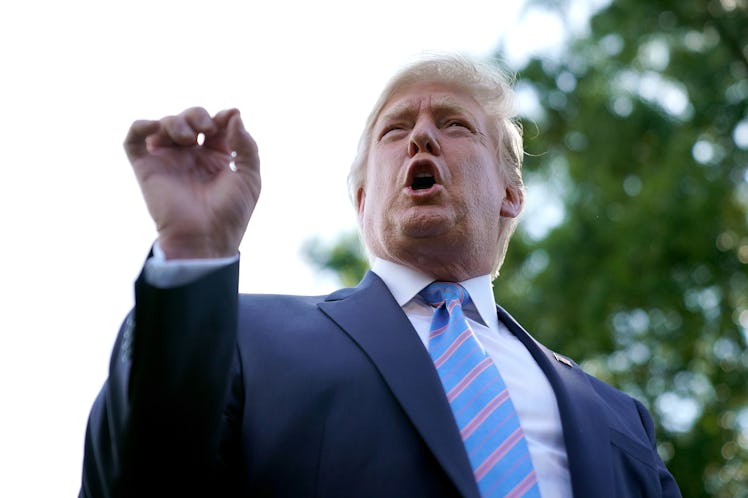
Donald Trump Tied Background Checks To Immigration After 2 Mass Shootings
It goes without saying that the news has been bleak over the weekend. On Saturday, Aug. 3 and Sunday, Aug. 4 the United States experienced two mass shootings in Dayton, Ohio and El Paso, Texas, and people across the nation have been pushing for change. As the conversation surrounding gun violence heats up, Donald Trump's tweet about gun control tied it to an unlikely issue — immigration.
Residents of El Paso, Texas experienced a deadly mass shooting when an armed gunman opened fire at a Texas shopping center on Aug. 3, killing 20 people. Then, on Aug. 4, another mass shooting in a Dayton, Ohio neighborhood killed nine people, according to CNN. Over the course of two days, 29 people were killed. On Aug. 5, President Donald Trump took to Twitter to address the massacres. In two tweets, Trump called for Republicans and Democrats to work on stricter background checks so that victims would not "die in vain," and proposed connecting gun control legislation with legislation that would tackle immigration reform, his favored issue. He wrote,
We cannot let those killed in El Paso, Texas, and Dayton, Ohio, die in vain. Likewise for those so seriously wounded. We can never forget them, and those many who came before them. Republicans and Democrats must come together and get strong background checks, perhaps marrying ... this legislation with desperately needed immigration reform. We must have something good, if not GREAT, come out of these two tragic events!
The White House did not respond to Elite Daily's request for additional comment on the tweet.
For the record, neither of the alleged shooters are believed to be immigrants, so Trump's immigration remark is a bit of a head-scratcher.
On gun policy, however, universal background checks have wide support both among gun policy reform advocates and Americans in general, with a 2015 Gallup poll showing that 86% of respondents supported universal background checks for gun purchases. Under current federal law, guns sold at gun shows or in a "private sale" between individuals do not require a background check, and a 2015 study by the Harvard Injury Control Center estimated that 40% of gun sales do not go through a background check.
On Aug. 5, President Trump held a press conference in the White House at which he addressed the two mass shootings, but did not address any major gun policy changes, including background checks, or immigration. The president did, however, call for Extreme Risk Protection Orders, also known as "red flag laws," which temporarily restrict gun access to individuals who may be a harm to themselves or others. He said,
We must make sure that those judged to pose a grave risk to public safety do not have access to firearms. … that is why I have called for red flag laws, also known as Extreme Risk Protection Orders.
Trump did comment on racist language and white supremacy, calling them "sinister ideologies." He also called out the supposed influence of the internet and video games, claiming exposure to this technology can be dangerous. There is no evidence that video games lead to mass gun violence. During the press conference, he pushed for mental health law reform by stating individuals should get treatment, but he involuntarily confined "if necessary."
Trump concluded by stating he's directed the Department of Justice (DOJ) to propose legislation that would have those guilty of mass shootings be given the death penalty, and the capital punishment be delivered "without delay." On July 25, Attorney General William Barr announced the reinstatement of the federal death penalty after nearly two decades. According to Death Penalty Information Center, death-row prisoners can spend up to 20 years awaiting execution as they move through the appeals process.
Trump's comment about immigration reform could have been better timed. According to The Washington Post, authorities in El Paso, Texas are considering charging the alleged shooter with a federal hate crime after allegedly discovering anti-immigration remarks on the alleged shooter's social media. However, there's no explicit reason why Trump would tie strengthening background checks to immigration reform following the two mass shootings.
Very little action has been taken by Congress following numerous mass shootings in the United States over recent years. On Feb. 19, 2018, former Deputy Press Secretary Raj Shah told CNN that Trump would be open to improving federal background check systems after an armed gunman killed 17 people at Marjory Stoneman Douglas High School in Parkland, Florida on Feb. 14, 2018. However, Trump threatened a presidential veto on Feb. 25 if Congress passed that legislation.
The mass shootings in Dayton, Ohio and El Paso, Texas have restarted the conversation about gun control in America. Time will only tell if Congress enforces stricter background checks.